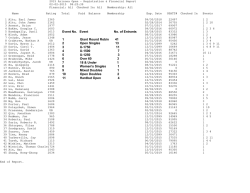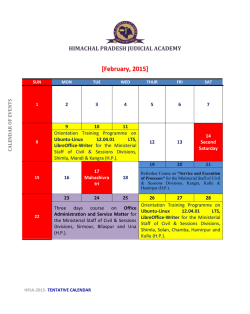
29 January 2015 - United Nations Office on Drugs and Crime
European Union Statement on the occasion of the th First Intersessional Meeting of the Commission on Narcotic Drugs, 58 session Thank you, Mr. Chairman, 1. I have the honour to speak on behalf of the European Union and its Member States. 2. UNGASS 2016 will be a prominent platform and a very useful opportunity for the international community to assess the achievements of the international drug control system, and to openly discuss the vast number of challenges that remain in the global, local and national response to the world drug problem. UNGASS 2016 must focus therefore on how to take forward, operational and sustainable approaches in order to respond to the realities on the ground within the framework of the international treaties, in particular three drug control conventions and universal human rights instruments. A successful outcome of UNGASS 2016 will provide solid input as a stepping stone towards the target date of 2019 and also beyond, notably in terms of the worldwide promotion of human rights and protection of public health. 3. The 2013-2020 EU Drug Strategy defines the principles and objectives of drug policy in EU Member States. Important features are the choice for a balanced, integrated and evidence-based approach, looking for an effective combination of supply and demand reduction measures, addressing new challenges which have been identified in recent years. 4. Health promotion and protection are key concepts in the demand reduction efforts stipulated by the EU Drug Strategy and UN documents. The use of drugs is understood as primarily a health or well-being issue, based on the available research evidence. The EU has provided substantial funding to contribute to research providing a more robust evidence base for this view. 5. We emphasise that it is very important to protect citizens against social and societal damage caused by drug use and to tackle marginalization and stigmatization and to contribute to reintegration in society. In this sense, dependant drug users shall be considered as people who need treatment and care. 6. The EU strongly believes that UNGASS should not be a mere replica of the High Level Review of the 2009 Political Declaration and Plan of Action carried out in March 2014. The 2014 Joint Ministerial Statement shall serve as a very important baseline for the debate, but we should take the opportunity to discuss within UNGASS 2016 also those issues that, regrettably, have not been included in the 2014 Joint Ministerial Statement. In this regard, we appreciate the reference in the CND Chair's non paper issued in December 2014 on a discussion on “what works and what does not” at the national, regional and international level. Nevertheless, UNGASS is a review of the achievements made and challenges encountered in the implementation of the 2009 Political Declaration and its specific targets, and this should remain the key priority. 7. We reject the argument that Member States should refrain from discussing, within UNGASS 2016, issues that were not included in the 2014 Joint Ministerial Statement. 8. A priority from the EU perspective is the abolition of the death penalty in all circumstances, and in particular the defence of international minimum standards that prohibit the death penalty for drug-related crimes and, in the wider framework, the promotion of effective drugs policies based on the protection of public health and respect for human dignity, liberty, democracy, equality, solidarity, the rule of law and human rights, which are the principles inspiring the European Union Drugs Strategy 2013-2020. 9. We also underline that UNGASS should strongly focus on international cooperation against drugs trafficking, including judicial cooperation, public security and countering money-laundering as well as enhancement of alternative development based on a development-oriented approach. We anticipate that the issue of New Psychoactive Substances will also be an important topic for UNGASS. 10. As regards to the proposed draft provisional agenda for UNGASS 2016, we consider that human rights, access to essential medicines as well as the involvement of the civil society should be cross-cutting issues in all High Level Workshops. We welcome the consensus for a strong engagement of the NGOs in all debates. The EU attaches a great importance to the role of civil society, including the scientific community, in the elaboration and effective implementation of drug policies. We also support the proposal of a formal civil society hearing during CND 2015 and a formal civil society hearing prior to UNGASS, the outcomes of which should contribute to the UNGASS processes, and we welcome the establishment of the Civil Society Task Force. 11. We appreciate the efforts undertaken to guarantee an inclusive preparatory process leading to UNGASS 2016 and emphasise the need to ensure the most effective involvement of all relevant UN agencies and bodies, in particular dealing with public health, human rights, development and security both in the preparations for and during UNGASS 2016 itself. GA Resolution 69/200 invites all relevant UN agencies and bodies to contribute fully to the preparations for UNGASS and we welcome their active role. 12. We welcome the idea to organise High Level Workshops during the UNGASS 2016 in parallel to the high level general debate and the suggestion that these workshops should be interactive, including involvement of all stakeholder. We support proposal to have four workshops and we consider that this will make the debate more proactive and focused. 13. We believe that the action-oriented recommendations to be prepared by the CND and adopted at UNGASS 2016 should be concrete and focused, providing solid input as a stepping stone towards the target date of 2019 and beyond. We support the proposal to reflect in a Chair’s summary the salient points raised during each of the High-Level Workshops. 14. Finally, we support the proposals put forward concerning the organization of work for the UNGASS Special Segment at the occasion of the 58th session of the CND, in March 2015, that will be a crucial step to take further decisions in particular on the substantive matters of UNGASS 2016. 15. We conclude by reiterating our commitment to provide further inputs as regards the preparation process for the UNGASS 2016 as soon as the revised non-paper is available. Thank you Mr. Chairman.
© Copyright 2026

